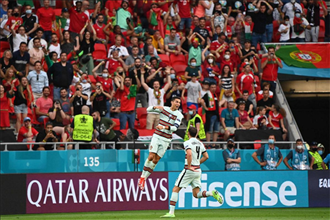According to CCTV5 program list (March 2, 2024), the draw ceremony of the European Cup has ended, and 24 teams have been divided into six groups, some of which seem to be relatively balanced, while some groups have obvious disparity in strength. However, some fans and media have found an interesting phenomenon,
According to CCTV5 program list (March 2, 2024), the draw ceremony of the European Cup has ended, and 24 teams have been divided into six groups, some of which seem to be relatively balanced, while some groups have obvious disparity in strength. However, some fans and the media have found an interesting phenomenon, that is, some traditional strong teams, such as England, Belgium, Italy, etc., can avoid some strong opponents and are assigned to relatively weak groups. Is this a coincidence? What's the secret?
In fact, this is not a secret, but determined by the draw rules of the European Cup. The draw rule of the European Cup is to divide the teams into four grades according to the European ranking of the participating teams and the results of the qualifiers. There are six teams in each grade, and then one team from each grade is drawn to form a group of six teams. Such a rule seems fair, but there are some special circumstances that lead some teams to gain advantages.

First of all, since there are 12 host countries of the European Cup and each host country has a team participating in the competition, in order to ensure that the host country can play in its own country, the draw rules of the European Cup stipulate that the team of the host country must be assigned to a group corresponding to the city of its own country. For example, England is the host country of London, so England must be assigned to Group D corresponding to London. Although such regulations are beneficial to the fans and economy of the host country, they also affect the randomness of the draw, allowing some teams in the host country to know their team positions in advance, thus avoiding some powerful opponents.
Secondly, because the European Cup qualifiers are played in the form of leagues rather than knockout rounds, some teams can gain advantages. Because of the form of the league, some strong teams can easily achieve excellent results in the qualifiers, so as to improve their European ranking, and then obtain a higher level, so as to avoid some powerful opponents. For example, Belgium has achieved a perfect record of winning all 10 matches in the qualifiers, becoming the first team in Europe, thus entering the first level and being placed in Group B, which is weaker than Russia, Denmark and Finland.
Finally, because the draw rules of the European Cup also take into account some other factors, such as politics, geography, climate, etc., this also allows some teams to gain advantages. Because of these factors, some teams can avoid playing against some unfriendly or unsuitable countries, thus reducing some unnecessary troubles and difficulties. For example, due to its geographical location, Italy was assigned to Group A, which is weaker than Turkey, Switzerland and Wales, and avoided the confrontation with France, Germany, Portugal and other strong teams.
To sum up, although the draw rules of the European Cup seem fair, there are some special circumstances that allow some teams to gain advantages and avoid some powerful opponents. Of course, this does not mean that these teams can easily advance. After all, football is round, and any team may be cold. We are looking forward to more exciting and pleasant surprises from the European Cup.












